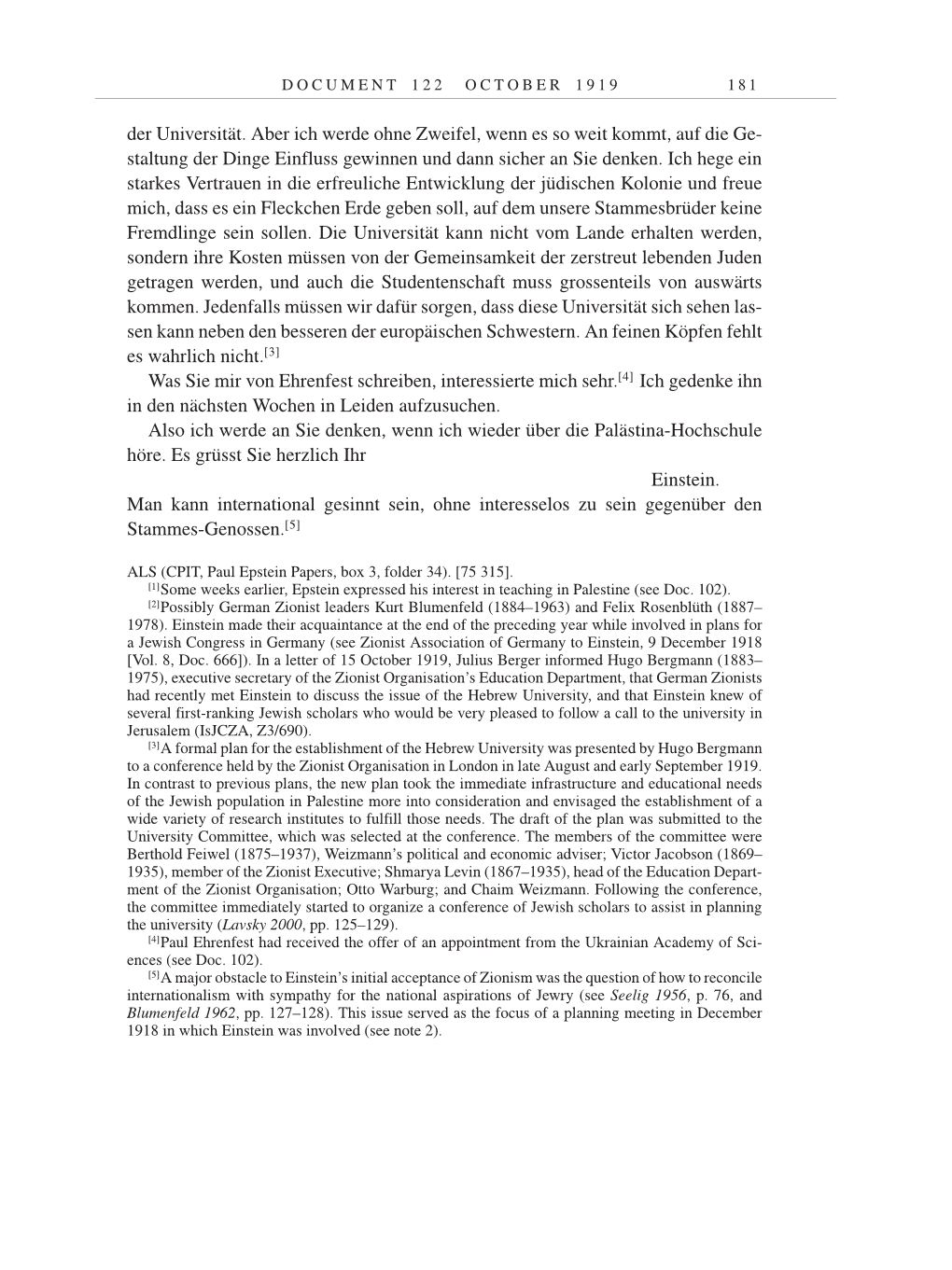D O C U M E N T 1 2 2 O C T O B E R 1 9 1 9 1 8 1
der Universität. Aber ich werde ohne Zweifel, wenn es so weit kommt, auf die Ge-
staltung der Dinge Einfluss gewinnen und dann sicher an Sie denken. Ich hege ein
starkes Vertrauen in die erfreuliche Entwicklung der jüdischen Kolonie und freue
mich, dass es ein Fleckchen Erde geben soll, auf dem unsere Stammesbrüder keine
Fremdlinge sein sollen. Die Universität kann nicht vom Lande erhalten werden,
sondern ihre Kosten müssen von der Gemeinsamkeit der zerstreut lebenden Juden
getragen werden, und auch die Studentenschaft muss grossenteils von auswärts
kommen. Jedenfalls müssen wir dafür sorgen, dass diese Universität sich sehen las-
sen kann neben den besseren der europäischen Schwestern. An feinen Köpfen fehlt
es wahrlich
nicht.[3]
Was Sie mir von Ehrenfest schreiben, interessierte mich
sehr.[4]
Ich gedenke ihn
in den nächsten Wochen in Leiden aufzusuchen.
Also ich werde an Sie denken, wenn ich wieder über die Palästina-Hochschule
höre. Es grüsst Sie herzlich Ihr
Einstein.
Man kann international gesinnt sein, ohne interesselos zu sein gegenüber den
Stammes-Genossen.[5]
ALS (CPIT, Paul Epstein Papers, box 3, folder 34). [75 315].
[1]Some weeks earlier, Epstein expressed his interest in teaching in Palestine (see Doc. 102).
[2]Possibly German Zionist leaders Kurt Blumenfeld (1884–1963) and Felix Rosenblüth (1887–
1978). Einstein made their acquaintance at the end of the preceding year while involved in plans for
a Jewish Congress in Germany (see Zionist Association of Germany to Einstein, 9 December 1918
[Vol. 8, Doc. 666]). In a letter of 15 October 1919, Julius Berger informed Hugo Bergmann (1883–
1975), executive secretary of the Zionist Organisation’s Education Department, that German Zionists
had recently met Einstein to discuss the issue of the Hebrew University, and that Einstein knew of
several first-ranking Jewish scholars who would be very pleased to follow a call to the university in
Jerusalem (IsJCZA, Z3/690).
[3]A formal plan for the establishment of the Hebrew University was presented by Hugo Bergmann
to a conference held by the Zionist Organisation in London in late August and early September 1919.
In contrast to previous plans, the new plan took the immediate infrastructure and educational needs
of the Jewish population in Palestine more into consideration and envisaged the establishment of a
wide variety of research institutes to fulfill those needs. The draft of the plan was submitted to the
University Committee, which was selected at the conference. The members of the committee were
Berthold Feiwel (1875–1937), Weizmann’s political and economic adviser; Victor Jacobson (1869–
1935), member of the Zionist Executive; Shmarya Levin (1867–1935), head of the Education Depart-
ment of the Zionist Organisation; Otto Warburg; and Chaim Weizmann. Following the conference,
the committee immediately started to organize a conference of Jewish scholars to assist in planning
the university (Lavsky 2000, pp. 125–129).
[4]Paul Ehrenfest had received the offer of an appointment from the Ukrainian Academy of Sci-
ences (see Doc. 102).
[5]A major obstacle to Einstein’s initial acceptance of Zionism was the question of how to reconcile
internationalism with sympathy for the national aspirations of Jewry (see Seelig 1956, p. 76, and
Blumenfeld 1962, pp. 127–128). This issue served as the focus of a planning meeting in December
1918 in which Einstein was involved (see note 2).
